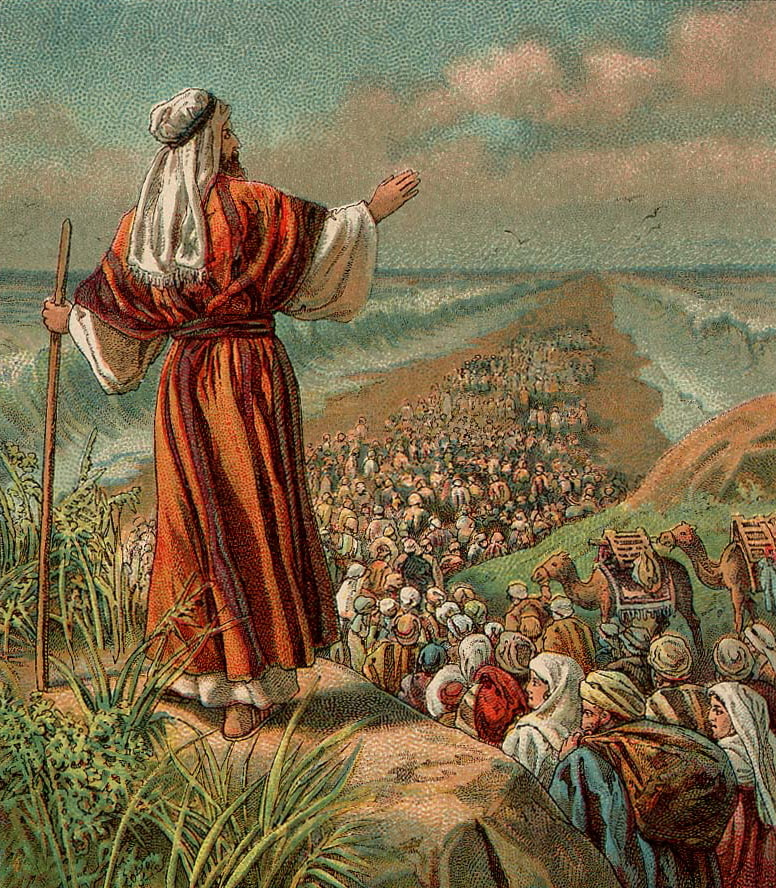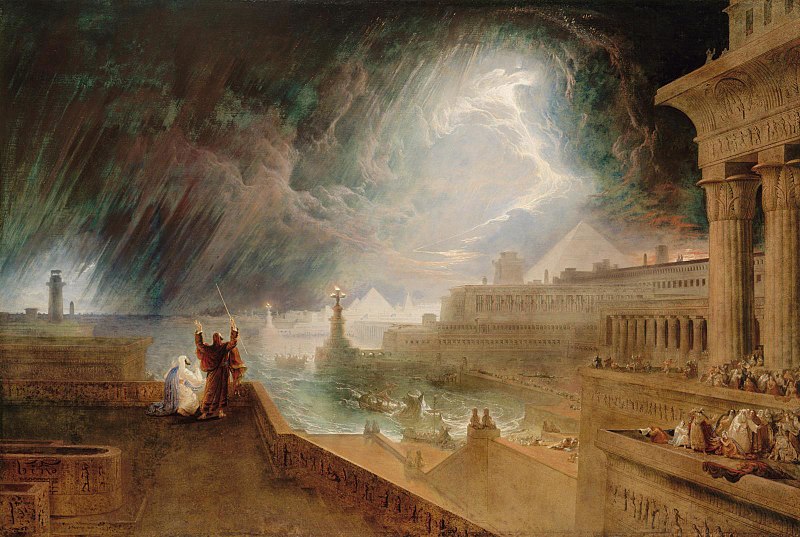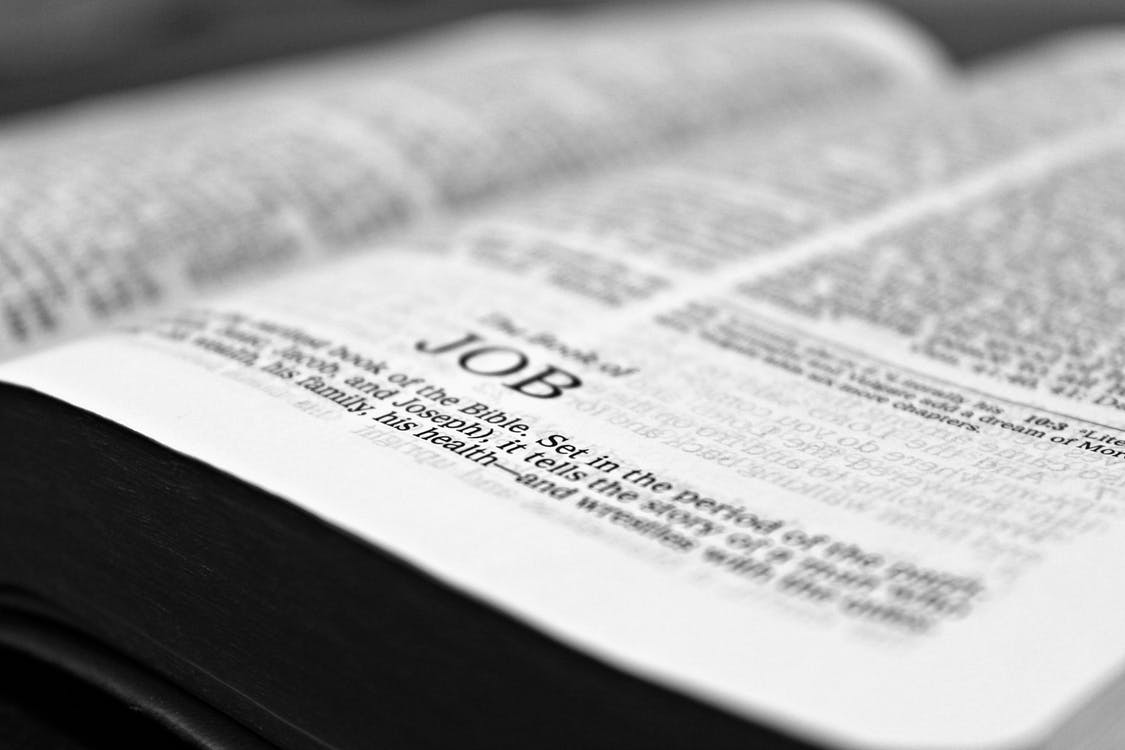|
After penning The Plagues of Egypt, and thinking ahead to the next big event in Exodus, I was lying in bed running lines in my head and came up with: From a land that is fertile to one filled with sand So, the following morning, my next poem began with those lines. And I struggled mightily with the direction it should go. And as lines and verses came and went and got moved around, these opening lines fell further from the top until they finally landed into the final stanza. As I read the passage in Exodus, I was reminded of the things I wrote in my Easter poem of 2019, Lamb Selection Day. Like, how the Israelites were to select their Passover lamb (or goat) on the tenth of the month, slaughter it on the fourteenth, put its blood on their door posts, and eat it in haste wearing their traveling clothes. By then, I was on a roll. I crammed in there how the grieving Egyptians literally begged them to leave and gave of their gold and clothing to the Israelites and how Joseph wanted his bones carried out of Egypt when they left. After I ran out of my general knowledge on this event, I was left with my "opening lines" and I wasn't sure how to wrap it all up. I thought of the previous lines I had written concerning how each successive Pharaoh knew less and less of Joseph and was harder on the Hebrews slaves because they were reproducing so rapidly. Then, I wondered how long the Israelites had lived in Egypt and found that the Bible clearly stated that is was 430 years. Except, that couldn't be possible since Moses was a great-grandson to Jacob and he had married his own aunt, who was a granddaughter to Jacob. This led me to Google the subject and I read of a controversy I wasn't even aware of — something I've never even considered. Consider the following: If Levi had conceived Jochebed on the very last day of his life, then Jochebed would have had to given birth to Moses when she was 257 years old in order to get a period of 430 years for the sojourn in Egypt (93 years that Levi lived in Egypt, plus Moses’ 80 years (Exodus 7:7) when he arrived to deliver the children of Israel—93+80+257=430). Interesting stuff. Anyway, out of all of this study the final two lines were formed. In fact, the final line was changed and fine-tuned again last night as I was writing this blog. Exodus We were told to select a young goat or a lamb,
one unblemished from out of our herd. We inquired of Moses who told us, I AM, God Jehovah was keeping his word. On the tenth of the month our selection was made; on the fourteenth it cooked in a roast. We made sure that the blood of the lamb was displayed on the frame of the door and each post. Then we ate with our sandals and cloak that we wore, and we ate with our staff in our grasp. With its meat in our belly and blood on our door, we awaited God's hand to go past. When a wailing filled Egypt, we knew in our heart that the people would beg us to leave. With their clothing and gold they compelled us depart; every family of Egypt in grief. Take my bones when you leave here, was Joseph's request, so we packed them with all that we own. We've been slaves, yet our children would be more oppressed when the next Pharaoh sat on his throne. From a land that is fertile to one filled with sand; we have miles of desert to roam. Once, the children of Israel arrived by God's hand; now, its time that his children went home. In my Bible-reading, I entered into Exodus at the start of 2020. With Israel's grand departure before me and Christmas in the rear-view mirror, I imagined the ten plagues of Egypt written in the guise of The Twelve Days of Christmas. After a week or two of thinking about it and realizing it couldn't be done, I started writing things down in order to prove it. As I realized I couldn't bend the words of the story to be sung with that familiar tune, I also realized that it shouldn't be sung as comedic relief. Especially when I stopped to consider the devastation of even one of those plagues, let alone ten — one after the other. So, even though I didn't accomplish what I originally had in mind, the end result was even more satisfying (as well as gratifying). The key element for me was to emulate the Christmas song by — not repeating the same lines over and over — but, rather to rephrase the horror of each plague after each new plague was introduced. I started writing this on January 15. The reason I know that is as follows: At work, we receive a daily email containing company information. At the bottom of that email is a quote from a famous person. So, with me starting this poem on the 15th, the email from the 16th had a quote from Lillian Gish, the American actress. A happy life is one spent in learning, earning, and yearning. The Plagues of Egypt With the first plague on Egypt, to the Pharaoh I said: now behold, watch my God turn your river blood-red. Both the water in jars and the Nile are changing — still, he won't let God's children go home. With the next plague on Egypt: you had better prepare to have frogs in your houses and frogs in your hair. While some wonder what's next since they only know fishing — now they can't take a step without feeling frogs swishing — still, he won't let God's children go home. With the third plague on Egypt, Aaron stretched out his hand and the dust became gnats and they covered the land. There's no water for drinking regardless of riches — and the frogs are on dishes instead of in ditches — now the gnats bite and pester and leave them with itches — still, he won't let God's children go home. With the fourth plague on Egypt, I said: look to the skies, for my God will be sending a great swarm of flies. And the river is full of dead fish that are rotting — neither human nor beast find relief in their swatting — people try to lie down but the frogs are there squatting — now the flies are obscuring the sun with their blotting — still, he won't let God's children go home. With the fifth plague on Egypt, to the Pharaoh I said: by tomorrow, your livestock in fields will be dead. Oh, the stench of the Nile and all that's decaying — with the frogs there's no walking or sitting or laying — and the gnats drive the animals mad — hear them braying — there's no end to the flies — whether shooing or spraying — no more sounds of the animals mooing or neighing — still, he won't let God's children go home. With the sixth plague on Egypt, I said: now, for your sin you'll have boils on you and your animals' skin. Now the sight of the river they love is heartbreaking — there are frogs in the laundry and frogs in the baking — what a racket the gnats in the ears have been making — and the flies make it seem like the whole world is shaking — all the livestock is down, nevermore to be waking — now they can't stand or sit — oh, these boils are aching — still, he won't let God's children go home. With the next plague on Egypt, I said: God sends his rains; cloaked in thunderous hail so that no life remains. Oh, their once-fertile river has yet to start healing — and the frogs that are stepped on are croaking and wheeling — while the gnats have the aged ones retching and reeling — and the flies bother children and babies are squealing — from the loss of their livestock they’re numb and unfeeling — with their scraping of boils, it has left their flesh peeling — now the hail and the rain have caused leaks in the ceiling — still, he won't let God's children go home. With the eighth plague on Egypt, mighty God had revealed: by tomorrow greats locusts will blacken the field. While the fish float on water, on banks they are flopping — there are millions of frogs and the frogs keep on hopping — such a minuscule gnat, but their torment is whopping — and no matter their efforts, the flies are not stopping — and the anguish to watch as the livestock are dropping — oh, the pain of it all when the boils are popping — and the sound of the hail in the puddles when plopping — hear the din in the fields as the locusts are chopping — still, he won't let God's children go home. With the ninth plague on Egypt, God said: stretch out your hand for the next three days darkness will cover the land. All the water is bad and there is no denying — and they cannot think straight with the frogs multiplying — and the children are covered with gnats and they're crying — and they're weary of swatting the flies that are flying — and they wonder why suddenly cattle are dying — with the boils so painful, their flesh feels like frying — all the thunder and lightning and hail's terrifying — hordes of locusts are swarming, their fields occupying — now they can’t pierce this darkness, there’s no use in trying — still, he won't let God's children go home. With the tenth plague on Egypt, 'twas my last time to warn: God will take from each parent their son if firstborn. No papyrus-made boats on the Nile are sailing — there is nothing but frogs on the steps and the railing — and the swarming of gnats can't be kept from inhaling — from the flies, there's frustration — all their efforts are failing — on the ground, sheep are frothing and donkeys are flailing — with the boils comes blisters and ulcers and scaling — and the heavens let loose with their thunderous hailing — all their crops have been ruined from locusts assailing — the Egyptians can't see where they walk from the veiling — now, from Pharaoh on down, every family is wailing — but he’ll NOW let God's children go home. I was about to post this yesterday, but I suddenly made two major changes.
Although the poem was completed in January, I decided that I wasn't real happy with the final stanza. In that verse, the ten italicized lines were ending with grieving, thieving, leaving, ceiling, peeling, reeling, breathing, heaving, squealing, and teeming. Similar-sounding words, but not close enough. So, I moved some verses around, adding to some and subtracting from others to make things a little purer. The other thing I did was to reverse the order of the italicized lines. The original poem had them counting down to the first plague, like ending with the first day in The Twelve Days of Christmas. So, they were all ending with a line concerning the Nile River. Yesterday, it dawned on me that it probably should be reversed. It was an interesting exercise, to be sure. One that can be crossed off an imaginary list. And one that is a little difficult to read as the cadence keeps changing. The first line of each verse has 13 beats; the second line has 12; the italicized lines are back to 13 beats, but end with 2-syllable words; and the final line of each verse have 9 beats. Yikes!
This is my last post concerning Job . . . for a while, at least.
Last year (in January 2019) I purchased a Chronological Study Bible and started reading it at a leisurely pace in the hopes of gaining new Biblical insight as well as writing some poetry along the way. So, that January, while reading through Genesis, I wrote five poems. There was a poem that included a few themes in Genesis, called In the beginning; one about Abraham NOT sacrificing Isaac in The Lord will Provide; another about Jacob in Jacob, the Deceiver; about Joseph in Have you heard the latest?; and, finally, about Jacob blessing his twelve sons in The Blessing, found in Genesis 49. Chronologically-speaking, Job follows directly after Genesis. I had never read Job before and I couldn't believe what I was reading — as I was literally reading it for the first time. I came into Job with the idea of writing four or five poems but, after reading a few chapters, I couldn't decide which chapter to zero in on (since they were all so good!) So, I went back to the beginning of the book. The first two chapters of Job contain the narrative that sets up Job's story. Chapter 3 really begins the poetic conversations between six characters that continue into the final chapter, Chapter 42. Starting with Chapter 3, I ended up writing a total of 40 chapters. And, God was good! I truly felt the hand of God as I was being guided and helped along the way — being inspired with words and ideas for every verse. It took me five months to write the forty poems — on average, nearly 2 per week. I'd set the alarm for 5a in order to write before work. I was writing late at night and into the next morning. I was jotting ideas down throughout the day. I was totally consumed by this project. I used to blog about it as well. But, there were weeks when I would write 2, 3 — even 4 poems and it just got to be too much for me to keep up with the blogs, the newsletters, and the writing — and I ended up cutting everything out but the writing. All I wanted to do was to write! I spent the rest of 2019 reading and rereading the poems to really fine-tune them and to smooth out the rough areas.
The booklet above is a little side-by-side view of my poetry along with the Bible, using a variety of versions. It contains six poems — one for each of the 6 characters: Job, his three friends, a fourth guy that really surprised me when he suddenly showed up, and then, finally, God. Each of them speak with a different meter — a different rhythm to their speech.
|
Copyright © 2016-2024 • The Hawk's Quill LLC
All rights reserved
All rights reserved




 RSS Feed
RSS Feed